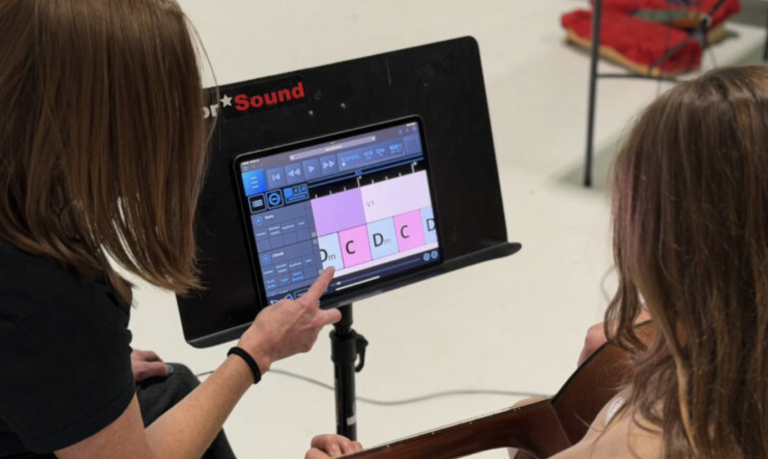
In today’s fast-paced world, it can be tough to find peace and quiet. But two timeless practices, music and meditation, offer a way to create that calm. Alone, each has its perks, but together, they can really amplify your mental wellness. This article takes a closer look at how combining music and meditation can enhance your mindfulness and overall well-being.
Key Takeaways
- Music and meditation together can boost relaxation and stress relief.
- Listening to music during meditation can help you focus and stay present.
- Music can help you connect with your emotions more deeply while meditating.
- Incorporating music into your daily routine can make meditation easier and more enjoyable.
- Choosing the right music is key; it should support your practice, not distract from it.
The Crescendo: Amplified Benefits

Okay, so when you put music and meditation together, it’s like turning up the volume on all the good stuff. It’s not just a little better; it’s a whole new level of awesome. Think of it as a supercharge for your mind and body. I’ve been trying it out, and honestly, the difference is noticeable. It’s like my brain finally gets a chance to chill out and recharge.
Heightened Relaxation
It’s pretty simple: music can help you relax. Meditation can help you relax. But when you do both at the same time? It’s like a relaxation explosion. The music helps guide you into a meditative state more easily, and the meditation helps you appreciate the music on a deeper level. It’s a win-win. I’ve found that I can get into a relaxed state much faster than if I were just trying to meditate in silence. It’s like the music is giving my brain permission to let go.
Improved Stress Management
Stress is a killer, right? We all deal with it. But music and meditation together? They’re like a dynamic duo fighting off stress monsters. Music can soothe your nerves, and meditation can help you gain perspective. I’ve noticed that when I combine them, I’m way less likely to freak out about small stuff. It’s like I have a built-in stress shield. Here’s a few things that I do:
- Listen to calming music during my commute.
- Meditate for 10 minutes before a big meeting.
- Take a music and meditation break in the middle of a stressful workday.
Enhanced Cognitive Functions
Who doesn’t want a sharper mind? Turns out, music and meditation can help with that too. It’s not just about feeling good; it’s about thinking better. I’ve noticed that my focus is way better when I regularly combine music and meditation. It’s like my brain is finally able to concentrate on one thing at a time. Mindfulness and self-awareness are key here.
I’ve found that incorporating music and meditation into my daily routine has made a huge difference in my overall well-being. It’s not a magic bullet, but it’s definitely a powerful tool for managing stress, improving focus, and just feeling better in general. Give it a try; you might be surprised at how much it helps.
The Ensemble: Combining Music and Meditation
Deepening the Meditative Experience
For those of us who find it hard to quiet our minds, music can be a real game-changer. It’s like a gentle guide, easing you into a relaxed state. The right music can really deepen your meditation. It’s not just about background noise; it’s about finding sounds that resonate with you and help you focus.
Reducing Distractions
Ever tried meditating in a noisy place? It’s tough! Music can help create a bubble of calm around you, blocking out distractions. Think of it as a sonic shield. It doesn’t have to be loud or overpowering; even soft, ambient sounds can make a big difference. It’s all about finding what works for you to minimize external noise and mindful listening to music.
Creating a Focus Point
Sometimes, the hardest part of meditation is just figuring out where to put your attention. Music can give you that focus. Instead of trying to empty your mind (which is nearly impossible), you can focus on the melody, the rhythm, or the individual instruments. It’s like having a built-in anchor for your thoughts. Here are some ways music can help:
- Provides a consistent point of focus.
- Helps to anchor wandering thoughts.
- Offers a gentle return when the mind drifts.
I’ve found that focusing on the music’s rhythm helps me stay grounded. It’s like the music is doing the work of keeping me present, so I don’t have to try so hard.
It’s not a magic bullet, but it can definitely make meditation more accessible and enjoyable. Experiment with different genres and see what helps you find your center.
Exploring the Psychological Impact of Music
Music does more than just sound good; it messes with your brain in interesting ways. It can tap into your emotions, help you chill out, and even boost how you think. It’s like a legal drug, but instead of side effects, you get better focus and maybe even some creative ideas. I’ve always known music makes me feel things, but understanding why is pretty cool.
Emotional Resonance
Music has a direct line to our feelings. A sad song can make you tear up, and an upbeat tune can get you pumped. It’s not just about the lyrics; the melody, rhythm, and even the instruments used can trigger different emotional responses. Think about how a movie soundtrack can totally change how you experience a scene. It’s the same thing, just in your own head.
Stress Reduction
Listening to music can actually lower your stress levels. It can help decrease cortisol, which is the hormone your body releases when you’re stressed out. I’ve noticed that putting on some chill music after a crazy day at work really helps me unwind. It’s like a mini-vacation for your brain. Check out these genres for stress reduction:
- Classical
- Ambient
- Nature Sounds (with music)
Cognitive Enhancement
Believe it or not, music can make you smarter. Studies have shown that listening to music can improve memory, attention, and even problem-solving skills. It’s like a workout for your brain. I sometimes put on instrumental music while I’m working, and I swear it helps me focus. It’s like having a secret weapon against distractions. Plus, the live music mindfulness sessions can be very effective.
Music is a powerful tool that can be used to improve your mental and emotional well-being. It’s not just entertainment; it’s therapy, a brain booster, and a way to connect with your emotions. So, turn up the tunes and let the music work its magic.
Incorporating Music and Meditation Into Daily Life

Beginner Approaches
Okay, so you wanna get music and meditation into your daily grind? Awesome! Don’t overthink it. Start small. Seriously.
- Morning Music Boost: Kick off your day with some chill tunes. Nothing crazy, just something that makes you feel good. Focus on the beat, the melody, and how it makes you feel. It’s like a gentle wake-up call for your soul.
- Mini Music Meditations: Set aside like, five minutes. Put on some instrumental music – ambient, classical, whatever floats your boat. Just sit (or lie down), close your eyes, and focus on the music. Let your thoughts come and go like clouds. Don’t judge ’em, just observe. This is a great way to start mindful meditation.
- Bedtime Beats: Wind down with some calming music before bed. It’s way better than scrolling through your phone. Helps you relax and get ready for sleep.
I remember when I first started, I was all over the place. Couldn’t sit still, couldn’t focus. But I kept at it, even if it was just for a few minutes each day. And slowly, but surely, it got easier. Now, I can’t imagine my day without it.
Advanced Strategies
Alright, so you’re feeling pretty good about the basics? Let’s kick it up a notch. Time to get a little more creative with this whole music and meditation thing.
- Active Music Making: Play an instrument? Sing? Do it! It’s like meditation in motion. Focus on the sounds you’re creating, the feeling of the instrument in your hands, the vibration in your throat. It’s a super immersive experience.
- Seasonal Soundtracks: Match your music to the seasons. Energetic stuff in the spring, mellow vibes in the fall. It’s a cool way to connect with nature and the changing rhythms of life.
- Mindful Music Listening: Really listen to music. Not just as background noise, but with your full attention. Notice the different instruments, the harmonies, the emotions the music evokes. It’s like discovering a whole new world in your favorite songs.
Creating a Personal Routine
So, how do you actually make this a habit? It’s all about finding what works for you. There’s no one-size-fits-all approach here.
First, figure out why you want to do this. What are you hoping to get out of it? Stress relief? Better focus? More inner peace? Knowing your "why" will help you stay motivated. Next, pick a time of day that works for you. Maybe it’s first thing in the morning, during your lunch break, or before bed. Consistency is key. Even if it’s just for five minutes a day, stick with it. Finally, don’t be afraid to experiment. Try different types of music, different meditation techniques, different times of day. See what resonates with you. Here’s a simple table to help you get started:
| Time of Day | Activity | Music Style | Duration | Notes |
|---|---|---|---|---|
| Morning | Gentle Wake-Up Meditation | Ambient, Classical | 10 mins | Focus on breath and music |
| Lunch | Stress Relief Break | Nature Sounds | 15 mins | Visualize a peaceful place |
| Evening | Wind-Down Relaxation | Instrumental | 20 mins | Let go of the day’s tension |
Adapting Music and Meditation for Life’s Challenges
During Stressful Times
When life throws curveballs, your music and meditation routine can be a real anchor. The key is to adjust your approach to match what you’re going through. Instead of sticking to a rigid plan, listen to what your mind and body need. If you’re feeling overwhelmed, opt for calming instrumental music – think ambient soundscapes or gentle classical pieces. Avoid anything with a strong beat or lyrics that might trigger racing thoughts. A short, focused meditation mindfulness exercises can also help center you.
For Emotional Healing
Music has a way of unlocking emotions we didn’t even know were there. When you’re working through emotional pain, choose music that resonates with your feelings, even if it’s sad or melancholic. Don’t be afraid to let yourself feel those emotions fully. Combine this with a meditation practice that focuses on self-compassion. Acknowledge your pain without judgment, and remind yourself that it’s okay to not be okay. Over time, you can gradually introduce more uplifting music as you heal.
Enhancing Creativity
Feeling stuck in a creative rut? Music and meditation can help you break free. Try meditating with music that inspires you – it could be anything from upbeat electronic music to world music with complex rhythms. The goal is to get your mind out of its usual patterns and open yourself up to new ideas. After your meditation, spend some time brainstorming or free writing. You might be surprised at what comes up.
I’ve found that when I’m feeling creatively blocked, a combination of ambient music and a simple breathing meditation can work wonders. It’s like hitting a reset button on my brain. I often get my best ideas when I’m not actively trying to come up with them, and this practice helps me get into that state of flow.
Understanding the Synergistic Effects
It’s pretty cool how music and meditation can work together. You know, like peanut butter and jelly, or coffee and a good book. Each is great on its own, but together? Something special happens. Let’s look at what makes this combo so effective.
Mindfulness and Self-Awareness
When you bring music into meditation, it’s like adding a spotlight to your inner world. It helps you notice your thoughts and feelings without getting carried away by them. It’s not about blocking out the noise, but about observing it. I’ve found that certain types of music make it easier to stay present, especially instrumental stuff without lyrics. It’s like the music creates a gentle container for your thoughts, so you can just watch them float by.
Emotional Expression
Music is a powerful way to tap into emotions. Think about it: a sad song can make you cry, an upbeat tune can make you dance. When you combine this with meditation, it can be a really healthy way to process feelings. It’s like giving yourself permission to feel whatever comes up, without judgment. I remember one time I was feeling really anxious, and I put on some calming music and just let myself feel the anxiety. It was uncomfortable, but it helped me work through it. It’s like the music gave me a safe space to explore those feelings. You can use music and mindfulness to help you express yourself.
Personal Growth
Combining music and meditation can be a catalyst for personal growth. It’s about more than just feeling good in the moment. It’s about developing a deeper understanding of yourself, your emotions, and your place in the world. It’s a journey, not a destination. And like any journey, it has its ups and downs. But the rewards are worth it.
Here’s how it can help:
- Increased self-compassion: You start to treat yourself with more kindness and understanding.
- Improved emotional regulation: You get better at managing your emotions in healthy ways.
- Greater sense of purpose: You start to feel more connected to something bigger than yourself.
Potential Drawbacks of Music in Meditation
While music can be a great addition to meditation for some, it’s not a one-size-fits-all solution. There are definitely some potential downsides to consider before you crank up the tunes during your next session. It’s all about finding what works best for you, and sometimes, that might mean sticking with silence. Let’s explore some of the common issues people run into when mixing music and meditation.
Distraction and Overstimulation
The biggest issue for many is that music can actually be more distracting than helpful. If you’re trying to quiet your mind, a catchy melody or thought-provoking lyrics can pull you right out of the meditative state. It’s like trying to focus on a book while someone’s having a loud conversation next to you. The key is to find music that fades into the background, rather than demanding your attention. Some people find that instrumental tracks work best for this reason.
Subjectivity of Music Tastes
What one person finds relaxing, another might find irritating. Music taste is incredibly personal, and what works for your friend might be a total disaster for you. It might take some trial and error to find the right type of music that complements your meditation practice. Don’t be afraid to experiment with different genres and artists until you find something that truly resonates with you.
Preference for Silence
For some people, silence is golden. They find that any external sound, even calming music, is an intrusion on their meditation. If you’re someone who prefers the quiet, don’t feel pressured to incorporate music into your practice. There’s absolutely nothing wrong with meditating in complete silence. In fact, for many experienced meditators, it’s the preferred method.
Ultimately, the goal of meditation is to connect with your inner self. If music helps you do that, great! But if it gets in the way, don’t hesitate to ditch the tunes and embrace the peace and quiet.
Wrapping It Up: The Power of Music and Meditation
So, there you have it. Mixing music with meditation can really change the game for your mindfulness journey. It’s not just about sitting in silence anymore; adding music can help you relax deeper and feel more connected to your emotions. Whether you’re a newbie or someone who’s been meditating for a while, this combo can make the practice more enjoyable and effective. Just remember, it’s all about finding what works for you. So, give it a shot! Try out different tunes and see how they fit into your meditation routine. You might just discover a new favorite way to unwind and find your center.
Frequently Asked Questions
What are the benefits of combining music and meditation?
Using music during meditation can help you relax more deeply, manage stress better, and even improve your focus and creativity.
How can I start using music in my meditation practice?
Begin by playing calming instrumental music for 5-10 minutes while you meditate. Focus on the sounds and let them guide your thoughts.
Is it okay to use music if I prefer silence when meditating?
Yes, it’s important to choose what feels right for you. If you like silence, stick with that. You can always try music later.
What type of music is best for meditation?
Look for soft, calming music without lyrics, like classical or ambient sounds. This type of music can help you focus and relax.
Can music help with emotional healing during meditation?
Absolutely! Music can help you connect with your feelings and process them, making it easier to heal emotionally.
Are there any downsides to using music in meditation?
Yes, some people might find music distracting or might have different tastes. It’s all about finding what works best for you.








